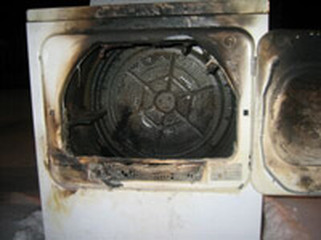DRYER SAFETY
Clothes dryers accounted for the largest share of appliance and tool fires between 1994-1998.
Facts & Figures
Source: NFPA's U.S. Home Product Report: Appliances and Equipment Involved in Fires, January 2002.
Safety tips
Facts & Figures
- There were 14,300 clothes dryer fires in U.S. homes in 1998, resulting in 19 deaths, 312 injuries and $67.7 million in direct property damage.
- The leading cause of home clothes dryer fires was lack of maintenance (30%), followed by unidentified or unknown-type mechanical failure (11%) and part failure, leak or break (10%).
- Clothing (not on a person) was the most common source of ignition in home clothes dryer fires, followed by dust, fiber or lint.
Source: NFPA's U.S. Home Product Report: Appliances and Equipment Involved in Fires, January 2002.
Safety tips
- Do not operate the dryer without a lint filter. Clean lint filters before or after each use and remove accumulated lint from around the drum.
- Make sure that the dryer is plugged into an outlet suitable for its electrical needs as overloaded electrical outlets can result in blown fuses or tripped circuit breakers.
- Turn the dryer off when leaving the home.
- Keep the dryer area clear of combustibles (i.e., boxes or clothing).
- Dryers should be installed and serviced by a professional.
- Have gas-powered dryers inspected by a professional regularly to ensure that the gas line and connection are intact.

